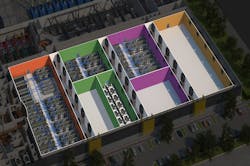In this week’s edition of Voices of the Industry, William Dougherty, Senior Vice President and Chief Technology Officer at RagingWire Data Centers addresses how the wholesale colocation market is changing and how that benefits the customer.
William Dougherty, Sr. VP and CTO, RagingWire Data Centers
The wholesale data center market is changing. In the past, wholesale colocation was viewed as a commercial real estate transaction. Floor space and power were the primary variables. Leasing was the typical contracting model. Most elements of the data center infrastructure would be dedicated to the customer. And the customer would be largely responsible for data center operations and maintenance.
A representative wholesale colocation transaction could be a 7-10 year lease for a 10-15,000 square foot facility with 2-3 megawatts of power. Included in the lease would be dedicated UPSs and generators to support the power that is required plus some number of immediately available backups.
Contrast the wholesale model to the traditional retail model. The primary metrics for retail colocation were the number of racks of equipment and the amount of power used (metered). A master services agreement was the contracting model. To save money, the customer would share high-cost building infrastructure with other customers. The data center provider would operate and maintain the facility on behalf of the customers, provide access to telecommunications services, and might provide other onsite support services such as technicians and security officers.
A typical retail colocation transaction could be a 3-year service agreement for the space and power to support five racks of equipment, along with cross-connects to telecommunications providers, and an availability agreement for shared infrastructure elements.
Retail colocation hasn’t changed much in the past few years, but there has been a quiet revolution in wholesale data center colocation.
Today’s wholesale customer is asking for smaller initial space and power allocations with larger ramps, contracts with shorter terms and more flexible terms and conditions, and more on-site amenities and services. Plus wholesale customers are increasingly finding value in the scale economics of shared infrastructure.
Why the changes in services and space/power? More enterprises are deciding they don’t want to be in the data center business. Designing, building, and operating data centers is a specialized skill set and unique business model that may not map to today’s nimble, software oriented enterprise IT organization. In many cases, enterprise data centers are shrinking or consolidating as computers can be stacked in tall racks and the drive to high density power usage has been slower than originally forecasted.[clickToTweet tweet=”William Dougherty: More enterprises are deciding they don’t want to be in the data center business.” quote=”William Dougherty: More enterprises are deciding they don’t want to be in the data center business.”]
In contracts, businesses are looking for terms and structures that support their current business plan and can morph to support strategic shifts. That means shorter terms with easy renewals, master services agreements, and various leasing structures. Flexibility is key. Power ramps and first rights of refusal are the norm.
The increase in on-site amenities and services is being driven by the view that the wholesale data center is an extension of the enterprise IT organization. When the IT team is onsite, they want a nice place to work with Class A office space, conference rooms, lounges, and break rooms. In addition the IT team is looking for flex resources that can assist with racking and stacking, troubleshooting, telecommunications, and security.
The last new trend is more of a philosophical debate about shared vs. dedicated infrastructure. What used to be an either/or discussion has become a hybrid. As automation, monitoring, and reporting have improved, enterprises are becoming more comfortable sharing infrastructure, provided they have assurances that their capacity is dedicated.
The result of these shifts is a wholesale colocation solution that can be as small as 250kW in size with a contract (services or lease) as short as three years. These contracts are now including greater flexibility in power ramps and a right of first refusal for contiguous space. The new wholesale delivery model takes advantage of the improved availability and greater flexibility provided by a mix of dedicated and distributed infrastructure. There is a quiet revolution going on in wholesale data center colocation, and the customer is going to benefit.
To meet the needs of this changing wholesale data center market, RagingWire is purpose-building wholesale data center campuses in Northern California, Ashburn, Virginia, and Dallas, Texas. For more on changes in the colocation market check out this PDF: Build-to Suit-Wholesale Data Center Solution.


